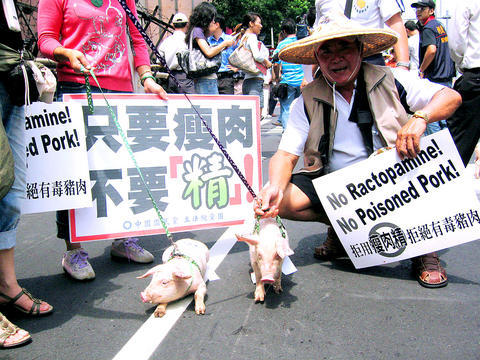The smell of rotten eggs filled Aiguo E Road in Taipei City yesterday morning as thousands of pig farmers gathered in front of the Department of Health (DOH) to protest a potential change in policy on the use of ractopamine.
Taiwan bans ractopamine, a drug that promotes the growth of lean meat in pigs and cattle, calling it a health hazard. The ban on the hormone covers domestic and imported meat.
However, the government has said it is considering lifting the ban on imported meat that contains ractopamine.

PHOTO: CNA
Farmers fear that, if the import ban is lifted, their products will suffer in the domestic marketplace.
Wu Fu-li, who is from a rural community near Kaohsiung City, said he came to Taipei to press for keeping the ban, warning that a change in policy would indicate double standards.
"The government doesn't allow us to use this chemical," he said. "Why do they allow other countries to import pork that contains it?"
During the protest yesterday, angry farmers hurled rotten eggs at police who stood guard at the DOH entrance. Police were also dispatched yesterday to guard the entrances of the Council of Agriculture and American Institute in Taiwan.
The crowd of protesting farmers briefly tried to overturn a barbed-wire barricade separating them from the government building, with some managing to break into the department's main entrance on Aiguo E Road.
Some farmers brought the piglets they had raised and threw eggs and pig excrement at the building, demanding that Department of Health Minister Hou Sheng-mou (侯勝茂) make an immediate appearance.
Hou eventually agreed to meet the protesters and was pressured to sign a formal agreement.
In the agreement, Hou was asked to promise that he would ban imports of pork containing ractopamine before any change in regulations takes effect and that in the future, the DOH and the council would have a consistent position on the issue.
Pan Lien-chou (
Those from Hualien could not attend because of landslides that were caused by Typhoon Sepat, he said.
Legislators from the Democratic Progressive Party, Chinese Nationalist Party (KMT) and Taiwan Solidarity Union also attended the event to support the pig farmers' cause.
Police made no arrests and there were no injuries during the protest.
At a separate setting yesterday, Premier Chang Chun-hsiung (
Asserting that the government is doing its best to properly handle the issue, Chang said he has instructed Vice Premier Chiou I-jen (邱義仁) to coordinate the work of government agencies in order to forge a consensus.
Additional reporting by AP and CNA

MILITARY BOOST: The procurement was planned after Washington recommended that Taiwan increase its stock of air defense missiles, a defense official said yesterday Taiwan is planning to order an additional four PAC-3 MSE systems and up to 500 missiles in response to an increasing number of missile sites on China’s east coast, a defense official said yesterday. The official, who spoke on condition of anonymity, said that the proposed order would be placed using the defense procurement special budget, adding that about NT$1 trillion (US$32,88 billion) has been allocated for the budget. The proposed acquisition would include launchers, missiles, and a lower tier air and missile defense radar system, they said The procurement was planned after the US military recommended that Taiwan increase

POLITICAL AGENDA: Beijing’s cross-strait Mid-Autumn Festival events are part of a ‘cultural united front’ aimed at promoting unification with Taiwan, academics said Local authorities in China have been inviting Taiwanese to participate in cross-strait Mid-Autumn Festival celebrations centered around ideals of “family and nation,” a move Taiwanese academics said politicizes the holiday to promote the idea of “one family” across the Taiwan Strait. Sources said that China’s Fujian Provincial Government is organizing about 20 cross-strait-themed events in cities including Quanzhou, Nanping, Sanming and Zhangzhou. In Zhangzhou, a festival scheduled for Wednesday is to showcase Minnan-language songs and budaixi (布袋戲) glove puppetry to highlight cultural similarities between Taiwan and the region. Elsewhere, Jiangsu Province is hosting more than 10 similar celebrations in Taizhou, Changzhou, Suzhou,

TWO HEAVYWEIGHTS: Trump and Xi respect each other, are in a unique position to do something great, and they want to do that together, the US envoy to China said The administration of US President Donald Trump has told Chinese President Xi Jinping (習近平) “we don’t want any coercion, but we want [the Taiwan dispute] resolved peacefully,” US ambassador to China David Perdue said in a TV interview on Thursday. Trump “has said very clearly, we are not changing the ‘one China’ policy, we are going to adhere to the Taiwan Relations Act, the three communiques and the ‘six assurances’ that were done under [former US president Ronald] Reagan,” Perdue told Joe Kernen, cohost of CNBC’s Squawk Box. The act, the Three Joint Communiques and the “six assurances” are guidelines for Washington

DEEPENING TIES: The two are boosting cooperation in response to China’s coercive actions and have signed MOUs on search-and-rescue and anti-smuggling efforts Taiwan and Japan are moving to normalize joint coast guard training and considering the inclusion of other allies, the Japanese Yomiuri Shimbun reported yesterday. Both nations’ coast guards in June sent vessels to the seas south of the Sakishima Islands to conduct joint training, the report said, adding that it was the second joint maritime training exercise since the nations severed formal diplomatic ties in September 1972. Japan dispatched the Nagoya Coast Guard’s Mizuho, a 134m, 6,000-tonne patrol vessel which can carry a helicopter, while the Coast Guard Administration (CGA) sent the 126m, 4,000-tonne Yunlin, one of its largest vessels, the report